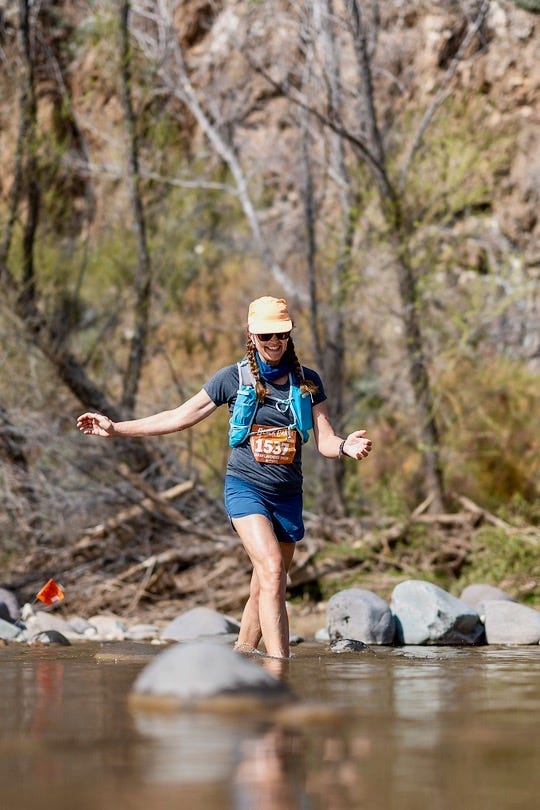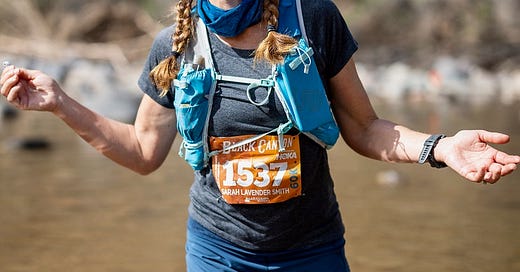I ran my first ultra of the new year last weekend and wrote a race report for paid subscribers describing my performance and some of the other competitors. This post is less of a race recap and focuses instead on coping strategies during endurance events. If you’d like to receive an occasional bonus post plus an invitation to a monthly meetup, please consider upgrading your subscription to paid.
About 22 miles into last Sunday’s Black Canyon 60K, my general fatigue became localized in my knees and lower back. I had been moving relatively well with a fluid stride and hardly any hiking breaks, except to pause through aid stations. Now, however, with 15 miles still to go in the 37-mile route, I hurt.
My knees, especially the left one, stiffened and ached, and if I bent my leg to bring my heel up closer to my butt, I felt a sharp pain on my kneecap, as if someone were poking a tender bruise. My lower back, always a weak link in my core, became stiff and achy. Consequently, my stride lost fluidity and became a shortened choppy shuffle. I took more hiking breaks with big, long steps to try to stretch and loosen the lower body’s muscles, but as soon as I resumed running, my body felt like a discarded lump of hardened bubble gum that had lost all elasticity.
Not coincidentally, the route became significantly more difficult around this point. Instead of a smooth ribbon of terracotta-colored desert dirt going flat or downhill through a landscape of cacti and sage, the route became littered with chunky rocks and trended uphill. The temperature hit the low 70s, which felt hot in the direct sun for someone like me coming from a sub-freezing snowy climate.
I expected this discomfort and had mentally prepared for it. I told myself, “This is normal; you only did one training run past 20 miles in this training block, so of course it’s going to start hurting now. You knew you’re undertrained, and this race will stress and stretch you in a good way.”
I also focused on the mantra and mind frame I had planned: Run like Courtney. Courtney Dauwalter, the female ultrarunner I admire the most, appears happy-go-lucky with a smile and stress-free composure no matter how painful and challenging the circumstances. I’ve heard her in interviews talk about her concept of “entering the pain cave,” a metaphorical space where her imagination explores and endures the sensations of pain, which I assume is an umbrella term that includes discomfort, fatigue, and frustration.
I tried to do the same in my mind—to acknowledge, explore with curiosity, and tame these discouraging physical sensations, and then try to let them go or, at least, accept rather than fear them or inflate their importance. I did a head-to-toe body scan as I ran, celebrating every part of my body that felt OK (“hey, upper right hamstring, you’re cooperating today, thank you!”) and releasing tension in every spot that was protesting (“lower back, will you feel better if I tuck my tailbone under a bit? Can I get you to ease up as if we’re doing cat-cow stretches while I’m vertical?”). I imagined the word melting in the sun and tried to make the pain melt and radiate away from my body.
The problem was, my knees still hurt, and this provoked anxiety that I couldn’t release. This, in turn, drained most of the satisfaction out of my run for the final third of the race.
Since running Sunday’s race, I’ve been puzzling over pain. How do you assess and manage it? What’s normal versus harmful pain? How does pain differ from discomfort and fatigue? How can it be linked to both frustration and pleasure? If it’s all in your head, then shouldn’t you be able to control it? Is it even real or just a figment of the imagination?
I wasn’t able to tell myself, “suck it up” and run through the pain worry-free because of reasonable concern that I’m causing damage and shortening the lifespan of one or both knees. Last year, an MRI showed I have a moderate case of chondromalacia patella in the left knee, a.k.a. the breakdown of cartilage under the kneecap. It’s common and unsurprising after running long distances for more than 25 years. Like brake pads, the cartilage wears down. My orthopedist told me I’m on a path toward osteoarthritis and a knee replacement. I’m doing all the recommended things (such as PT, accupuncture) to manage it, but my orthopedist would not recommend this 60K hard run.
So for all my “run like Courtney” positive self-talk, another part of my brain was thinking the worst and pondering if I should give up these long-distance runs and my aspirations to run another 100 later this summer. Yet another part of my brain was saying, “shut up and run” and trying to quiet the mental chatter by looking around and being highly observant of the surroundings, taking in the odd beauty of upright human-like saguaro cacti, and the yellow and reddish hues and hairy-like surfaces of barrel cacti.

What, exactly, was I feeling and objectively how bad was it? I followed the advice I tell my coaching clients: think of pain on a spectrum, because it’s not black and white. Try to give it a number, with 1 being normal and 10 so severe you couldn’t run even if you had to in an emergency. Discomfort in the 2 to 3 range, from a niggle “talking to you,” is normal and not worrisome, especially early in a run. The key is whether it escalates a few miles later (usually, the opposite happens and you forget about the sore area bugging you). If it escalates to a 4 or higher, and the pain becomes sharp rather than dull, you need to troubleshoot, which might entail walking breaks, shortening your stride, altering your foot strike, or using support such as an Ace bandage. If it affects your gait to the point where you’re running asymmetrically to favor the sore area, e.g. limping, then you should cut your run short unless it’s an “A” race that you have your heart set on finishing and you’re willing to risk longer-term injury and recovery for this day’s goal.
I’d give my pain about a 5. And I was running symmetrically. Oddly, both knees, not just the “bad” left one, hurt equally as I ran (only the left one hurt when I bent the knee past 45 degrees), so I concluded I could run with OK form and avoid excessively bending that one knee. I probably just had garden-variety inflammation. It definitely wasn’t bad enough to stop and drop out. It just felt discouraging. I wanted to be done—not only with this race, but perhaps with racing in general.
Worn out. That’s how my knees and whole being as an athlete felt when I reached the Agua Fria river crossing with about three miles left to go. Part of the discouragement, I knew, stemmed from comparing myself to others. I had witnessed the top runners in the 100K the day prior, when I volunteered at the Mile 50 aid station, and their ability to run fast miles that late in the race, at around what’s now my 5K pace, made me feel incredibly slow and washed up. As I wrote in last week’s post, I wanted to nurture my competitive drive in the most positive and fortifying way possible, and reach a time goal in this event, but I was close to not caring at this point.
I welcomed the river as a chance to cool down, and then to my surprise, I saw the photographer Howie Stern there and also welcomed the chance to talk to him. I decided to stop caring about my pace and my desire to finish under 7 hours, 45 minutes, and just chill out for a bit while chatting with Howie. I gingerly lowered myself in the cold water and felt relief in my knees.

It’s amazing how a pause that refreshes can change one’s mind frame. While talking to Howie, I noticed that a woman who I had leapfrogged earlier in the race had reached the river. She had graying hair so I assumed (wrongly, it turned out) she was in my age group (she was in her 40s). Some impulse in my lizard brain made me cut my talk short with Howie and scramble up the sandy bank. I told myself, time to be a closer! I did not want to get passed by her. Suddenly, I cared about finishing strong and putting a gap on her.
The next three miles, I focused intently on pushing myself to the edge of sustainable effort. We ascended switchbacks on a final hill, and at each hairpin turn on the switchback, I could see her close behind me. I kept pushing my pace to build a gap between us, feeling the satisfaction of seeing her fall farther behind, and when the route dropped down the hill toward the finish tents, I regained leg turnover that gapped her by about a minute.
I realize now, in hindsight, that I didn’t think about or feel my achy knees or lower back in those final three miles. I felt a parched mouth, sore quads, and tender feet, but those were feelings of high effort and fatigue, not pain per se. My mind, sparked by a competitive drive, had effectively chosen to focus on and feel something else. Now I’m more confused about the significant pain I felt earlier in the race. Did I make too big of a deal out of it? Or was it legit, but the break I took in the cool river water allowed me to reset it?
In any case, after hurting and experiencing discouragement, I ended the race in a super satisfying way. I finished in 7:48, a few minutes behind my goal, but the course measured about a half mile farther on my watch than expected.
Minutes later, all the pain came rushing back and felt stronger, to the point I’d give it around a 7 on that pain scale. I winced when lowering myself into a chair and could barely stand back up and hobble to the med tent, where I lay on a cot with ice packs on my knees for a while. As much as I had worried about long-term damage, I felt greater satisfaction and gratitude that I had not dropped or death-marched to the finish. I placed well into the top half of the field and second in my age group, which feels respectable (results).
The kicker is, by yesterday (two days post-race), my knees and back felt perfectly fine. Only my quads and calves had normal residual muscle soreness. I can go up and down stairs without any sensation that my knees are wearing out. I interpret all this as a green light to keep doing what I’m doing.
We’re told to “listen to our bodies” and respect pain as a boundary for exertion. But what if the body sends mixed signals and the pain is malleable? I’m encouraged by the experience in those final miles, when my brain shelved the pain for the sake of racing, and then quickly healed and returned to normal in the next 48 hours. Experiencing all the pain-related discouragement mid-race made the finish feel even more satisfying. That’s why pain and pleasure are linked.
This essay makes me reflect on my old friend Errol “The Rocket” Jones and a film made seven years ago, called “The Pleasure and the Pain.” REI commissioned the project (and I helped a bit with its production) to spotlight the Bay Area Ridge Trail, but because of Rocket’s incredible history and personality, the five-minute film turned into more of a story about suffering, aging, and persevering. It’s one of the best short ultrarunning films ever made, in my view. I hope you’ll watch it here. Watching it again—and seeing Errol and me run together midway through it, on one of my favorite trails in the Berkeley hills—makes me believe I still have a lot of miles left on these legs, and I’m willing to embrace more suffering.
Postscript
Hats off to Aravaipa Running for producing a stellar event. I’ve run a lot of their races over the years, and it’s impressive to witness how they’ve raised the bar on ultrarunning race management and live coverage. This two-day event (a 100K and 60K) attracted both the top elites and a surge of rookies. Everything about the aid stations, parking and shuttling, course marking, and general vibe was top notch.

As for the course itself, I heard many people rave about its beauty, but honestly, I’d grade it a B at best. The point-to-point trail was rather monotonous in terms of scenery. I found two other Arizona events by Aravaipa—Coldwater Rumble 100 near Phoenix, and Whiskey Basin 91K around Prescott—to be prettier and showcase a more varied terrain. That said, I’m glad I got to experience the much-hyped Black Canyon Ultras both as a volunteer Saturday and competitor Sunday.
And on a day like today, with howling winds and 10 inches of snow dumping outside my window, I greatly appreciate the opportunity to run in a T-shirt and shorts on a sunny day!





I LOVE this:
"We’re told to “listen to our bodies” and respect pain as a boundary for exertion. But what if the body sends mixed signals and the pain is malleable? I’m encouraged by the experience in those final miles, when my brain shelved the pain for the sake of racing, and then quickly healed and returned to normal in the next 48 hours. Experiencing all the pain-related discouragement mid-race made the finish feel even more satisfying. That’s why pain and pleasure are linked."
Finding that ability to intuit what's going on (which, of course, is not always so easy) is such an empowering and freeing skill, and I've found that it's taken consistent years of really tuning in and learning my body to start to get a feel for it. It's such a beautiful dance, with the body, that we get to engage in through running. I've found a lot of self-love, compassion, and wisdom in learning the steps. Thanks for this, Sarah.
Oh boy can I identify! I’ve done Black Canyon 2x - the 100K distance. The first time I fell on my last shakeout run 3 days before the race and smashed both of my kneecaps. I knew it would be a long day. Everything was fine until Black Canyon city and then it was pretty intense pain those last 25 or so miles. Everything resolved eventually. I just had to suck it up. I knew there was no meniscus tear and no swelling within the knee joint itself, it was all outside the joint so I didn’t worry. Honestly, I believe there is a wisdom to the body. If the pain is bearable enough and things work ok, then usually there isn’t irreversible damage being done - this is my reasoning as a physiologist. I’ve never DNF’d a race but I have been stopped in my tracks mid-run from pain and then I knew I was done! I stopped and walked home. If it had been a race I would have had to quit. From these experiences I feel I will likely be able to distinguish types of pain if I need to. Coincidentally, I was diagnosed with chondromalacia in college. Well…. I’m 55 and still running fine! Knees stay healthy with good running form and targeted strength work. It’s not too late to mitigate. Most orthos see people who just continue on the same path, and do nothing to change the underlying cause of whatever the issue is. It might not be too late to get a good PT and change the trajectory. I’m glad you finished strong and are doing well!